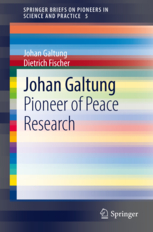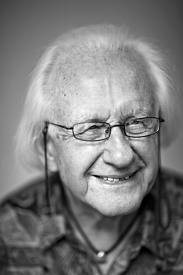Johan Galtung: Pioneer of Peace Research – Edited by Dietrich Fischer
REVIEWS, 7 Oct 2013
Dr. Vithal Rajan – Bangla Times
 Professor Fischer is a long-standing and devoted friend and colleague of Johan Galtung, the widely acknowledged ‘father of peace research.’ In this new book, he brings together a collection of 16 key essays by Galtung; a voluminous Galtung bibliography, listing 165 books written between 1953 and 2012; and a detailed introduction to the life, beliefs, and writings of Galtung.
Professor Fischer is a long-standing and devoted friend and colleague of Johan Galtung, the widely acknowledged ‘father of peace research.’ In this new book, he brings together a collection of 16 key essays by Galtung; a voluminous Galtung bibliography, listing 165 books written between 1953 and 2012; and a detailed introduction to the life, beliefs, and writings of Galtung.
The book covers such concepts as direct, structural and cultural violence; theories of conflict, development, civilization and peace; peaceful conflict transformation; peace education; mediation; reconciliation; a life-sustaining economy; macro-history; deep culture and deep structure; social science methodology.
Galtung, a mathematician, sociologist, and political scientist, founded the International Peace Research Institute in Oslo in1959, the world’s first academic research centre on peace studies, and the Journal of Peace Research in 1964. He has established dozens of other peace centres around the world, and taught at universities in Oslo, Berlin, Belgrade, Paris, Santiago de Chile, Buenos Aires, Cairo, Sichuan, Ritsumeikan in Japan, Hawai’i, Tromsoe, Bern, Alicante in Spain, and at the American universities of Columbia and Princeton. Johan Galtung’s innovative work for peace has earned him thirteen honorary doctorates and professorships, and numerous awards, including a Right Livelihood Award (also known as Alternative Nobel Peace Prize) in 1987; the Bajaj International Award for Promoting Gandhian Values, 1993; the Norwegian Literary Prize Brage, 2000; the First Morton Deutsch Conflict Resolution Award, 2001; the Premio Hidalgo, Madrid, 2005; Augsburg Golden Book of Peace 2005; Marburg Golden Book 2007; the DMZ Korean Peace Prize in 2010; the Erik Byes Minnepris, 2011; the Khan Abdul Ghaffar Khan International Peace-Builder Award in 2011; and the Nepal Peace Prize, 2013.
When Galtung as a young man was sent to jail for six months for refusing to serve in the Norwegian army, he wrote his first book on Mahatma Gandhi, and has continued to consider him as ‘the master of masters.’ Galtung says, ‘Of eight fault-lines in the human construction between humans and nature, between genders, between generations, between races, between castes and classes, between nations, between countries, Gandhi picked up six.’ Dismissing the notion that Gandhi was an idealist, Galtung asserts that ‘his mind and actions were far too complex, holistic and woven into a complex Indian reality.’ ‘His vision speaks through his life’s work: unity of humans.’ Gandhi could not have put it better himself.
In 1969, Galtung created an additional understanding of violence, as practiced by the state or the powerful – ‘structural violence’ in contrast to ‘direct violence’. By 1990 he had added the concept of ‘cultural violence’ — the intellectual justification for direct and structural violence through beliefs in the superiority of nations, races, masculinity, and other expressions of prejudice in education, the media, literature, films, the arts, street names, and even monuments celebrating war ‘heroes.’
He developed a concept of positive peace, which includes mutually beneficial cooperation on a basis of equality, and a process of mutual learning to heal violence in the past and prevent violence in the future. In 2000, Galtung founded the Transcend Global on-line Peace University, and its non‑profit network for Peace, Development and the Environment, with over 500 members in more than 70 countries around the world. The main focus of the Transcend method is not merely to identify who is guilty and punish them, the traditional legal approach, but to create an attractive new reality acceptable to all those involved. This present collection of Galtung’s essays gives a clear and detailed picture of the Transcend method.
Galtung has mediated in over 100 conflicts. He predicted the end of the Soviet Empire almost to a day. Few know that his work on how to end the cold war enabled the Russians to dismantle the Soviet regime, helping them, as Shevardnadze said, to create a ‘successor system’ to the Cold War. Galtung also predicted the financial crises that would strike the capitalist system. One well-known prediction of his that still remains to be proved says that the Kashmir problem will find a quick solution soon, since ‘Eurasia cannot tolerate a conflict of that magnitude in its midst.’
When writing about a possible movement from the 20th century of war to a 21st century of peace, Galtung, very realistically, puts his finger on the main problem:
All over the world the ruling states were basically the instruments of Males: Older, White and Bourgeois, from Anglo-Saxon and other Western nations, ruling directly or indirectly, through their vast systems of colonialism and imperialism. The struggle against that tiny MOWB-syndrome on earth is still on.
This book brings out many unknown facts about an extraordinary man, erudite beyond the imagining of most people, warm and loving as no other famous person has been, a prophet who has devoted his life to leading humanity out of the valley of mutual distrust and hatred to the companionable uplands of harmonious existence between nations, cultures, genders and strongly-held belief-systems.
In a lyrical chapter on the culture of peace, Galtung gives the reader two metaphors:
The first metaphor is health, like ‘peace is to violence what health is to disease’. A person can be healthy, a person, a group, a state, a nation, a region, a civilization can be peaceful. A world can be peaceful, at least better than today.
But we also talk of peace between persons, groups and so on. The second metaphor is love. Love is the union of body, mind and spirit, or, to be more precise, the union of those unions. The miracle of sex and physical tenderness. The miracle of two minds sharing joy and suffering, sukha and dukkha as buddhists would say, resonating in harmony. And the miracle of two persons having a joint project beyond themselves including reflecting constructively on the union of body and mind, and spirit.
And he goes on to compare the economy to the body, the polity to the mind and culture to the spirit, ‘particularly the deep, collectively shared, subconscious culture.’ The chapter ends with the whimsical battle cry:
Moderates all over the world unite! we have only fundamentalists to lose. In a peace culture of Empathy, Creativity, Nonviolence.
In a final chapter ‘Conciliation as Liberation from Trauma,’ Galtung makes two deep psychological assumptions:
1: Traumatizing the victim also traumatizes the perpetrator
2: They have a latent joint interest in exiting from trauma
These traumas continue to ‘transfigure, disfigure their mental and spiritual lives.’ The processes that the ‘Transcend’ conciliation method promotes are focussed on how to heal deep wounds, in individuals, communities, and nations.
The book carries a Preface by the well-known Argentinian psychologist, Sara Rozenblum de Horowitz. She writes: ‘His theory is no longer just a theory as it becomes an educational, social, and political toolbox.’
She speculates that the trauma in childhood of seeing his father arrested by the Nazis, whose lives he had saved as a doctor, might possibly have influenced his determination to work for peace all his life. ‘I believe that this childhood experience is related to the origin of his theory that most nations begin in trauma. I permit myself to add that the majority of individuals have lived through traumas that have marked our lives.’
A valuable book that requires a cheaper Indian edition, and translations into Indian languages.
__________________________
Vithal Rajan, OC, Ph.D. [LSE], FINS, worked as a mediator for the church in Belfast; as faculty at The School of Peace Studies, University of Bradford, and as Executive Director, the Right Livelihood Award Foundation. He has founded several Indian NGOs, is an Officer of the Order of Canada, and a member of the TRANSCEND Network for Peace, Development and Environment. vithal.rajan@gmail.com
Go to Original – banglatimes.com.bd
DISCLAIMER: The statements, views and opinions expressed in pieces republished here are solely those of the authors and do not necessarily represent those of TMS. In accordance with title 17 U.S.C. section 107, this material is distributed without profit to those who have expressed a prior interest in receiving the included information for research and educational purposes. TMS has no affiliation whatsoever with the originator of this article nor is TMS endorsed or sponsored by the originator. “GO TO ORIGINAL” links are provided as a convenience to our readers and allow for verification of authenticity. However, as originating pages are often updated by their originating host sites, the versions posted may not match the versions our readers view when clicking the “GO TO ORIGINAL” links. This site contains copyrighted material the use of which has not always been specifically authorized by the copyright owner. We are making such material available in our efforts to advance understanding of environmental, political, human rights, economic, democracy, scientific, and social justice issues, etc. We believe this constitutes a ‘fair use’ of any such copyrighted material as provided for in section 107 of the US Copyright Law. In accordance with Title 17 U.S.C. Section 107, the material on this site is distributed without profit to those who have expressed a prior interest in receiving the included information for research and educational purposes. For more information go to: http://www.law.cornell.edu/uscode/17/107.shtml. If you wish to use copyrighted material from this site for purposes of your own that go beyond ‘fair use’, you must obtain permission from the copyright owner.

Some brief remarks
1: Get the book! Its worth every penny. Dieter has done a terrific job concentrating access to Johan’s oeuvre in one place.
2: The book is also available as an Amazon ebook. So you can carry it width you everywhere you go, as I do.
Also available as an Amazon ebook are:
– Handbook of Peace and Conflict Studies by Galtung and Webel (editors and authors)
– Experiments with Peace: Celebrating Peace on Johan Galtung’s 80th Birthday by Jorgen Johansen and John Y. Jones (editors)
Unfortunately the TPU books are not Amazon ebooks (yet ???)
But you may be interested in another book from the same series as the one about Johan:
Dieter Senghaas: Pioneer of Peace and Development Research: Volume 6
Dieter Senhaas is our old comrade in NONarms in the Germanophonic lands from the 70’s and 80′
Sorry if you see that as a commercial but ebooks save forests and FLOORSPACE THAT IS INCREDIBLY EXPENSIVE HERE
Werner Meyer (Bern, Switzerland)